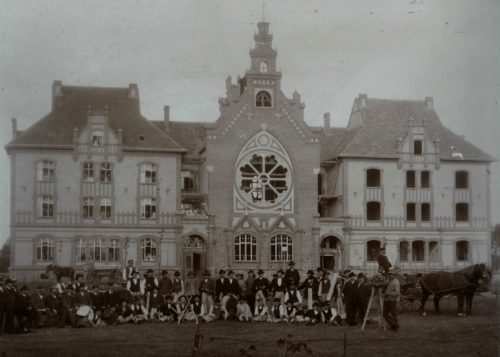-
 since 1899
since 1899History of Friedensau
Studying and teaching
History
Friedensau Adventist University celebrates over one hundred years of tradition.
Friedensau has been a place of education since 1899. On November 19, 1899, the institute that preceded the university, the “Industry and Mission School”, commenced operations with just seven pupils in very basic conditions. The school was housed in an old mill on the Ihle river, mentioned for the first time in 1306.
The next ten years saw the construction of an ensemble of large teaching and residential buildings which still define the look of the campus today. A sanatorium, workshops and a food factory were also built, in line with the school’s holistic pedagogical model. These facilities provided both a practical teaching opportunity as well as a way to earn money. Before World War I up to 250 people per year made use of the training opportunities offered.
During World War I the War Ministry set up a military hospital in the buildings. It was not until 1919 that training could be resumed, and expanded in subsequent years with new courses (home economics school, preparatory school for nursing, secondary-level courses in science and technology, business and childcare courses). In 1923 the name of the institution was changed to the “Friedensau Mission Seminary”. In 1930 the seminary received state accreditation from the administrative district officer of Magdeburg for its home economics and business courses.
The Nazi period brought many restrictions, culminating in the closing of the seminary in the Second World War. Again the teaching buildings were used for the care of sick and injured soldiers, first from the Wehrmacht, and from 1945 by the Soviet army.
Through the intercession of the Minister President of Saxony-Anhalt, Erhard Hübener, the Soviet military administration allowed the school to reopen in 1947. This made the Friedensau Seminary the first and only church training facility to be allowed to resume its teaching operations in the Soviet occupation zone.
During the GDR period, the SED (communist party) government allowed training of church employees only. In addition to training for pastors, there were one-year courses for deacons. In 1981 the high standards and quality of the training led to the new name, “Friedensau Theological Seminary”. Two years later the General Conference of the Seventh-Day Church accredited the seminary as a Senior College. Starting in the 1980s, students from other socialist states of Eastern Europe and Africa could be trained as pastors in Friedensau.
On September 15, 1990, the Theological Seminary became a state-accredited university following a decision by the Council of Ministers of the GDR. Later a School of Social Sciences was established alongside the School of Theology, which has offered Diploma and Master’s courses in theology since 1992.
Today the Friedensau Adventist University, as an academically-oriented, church-run university, awards university qualifications. Friedensau is an established place of scholarship and has research collaborations linking it with institutions in several continents.